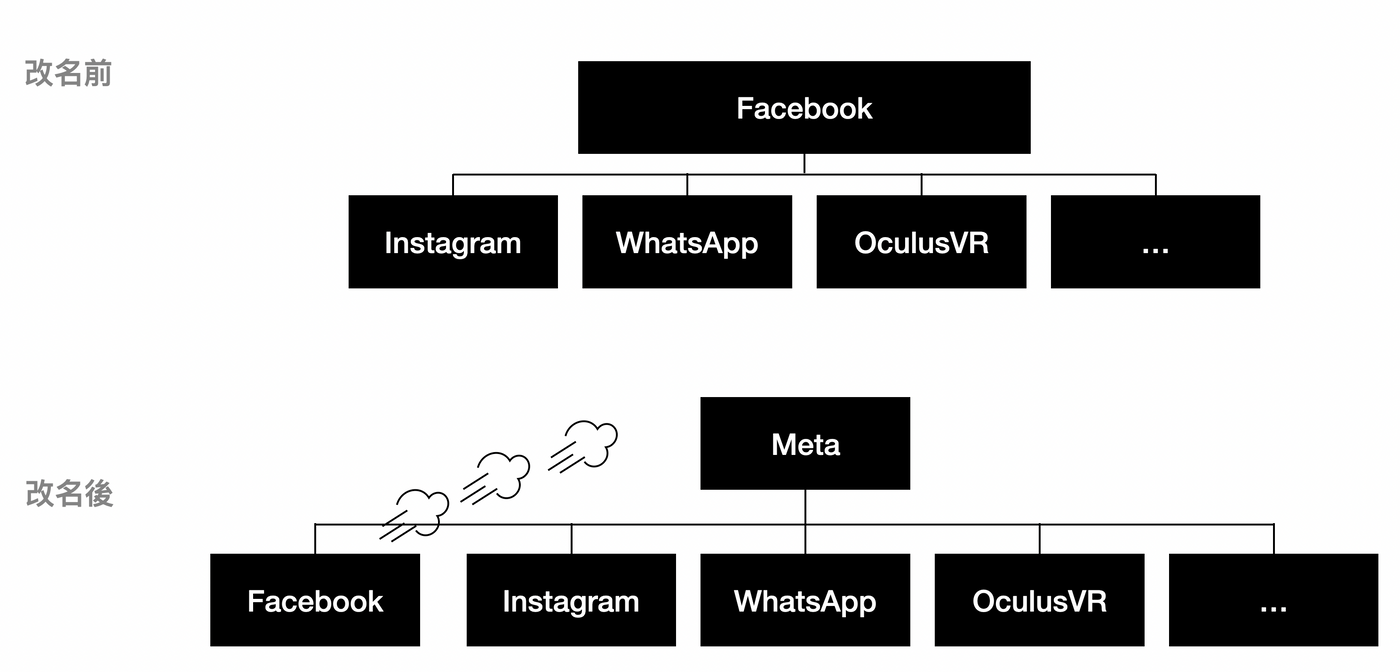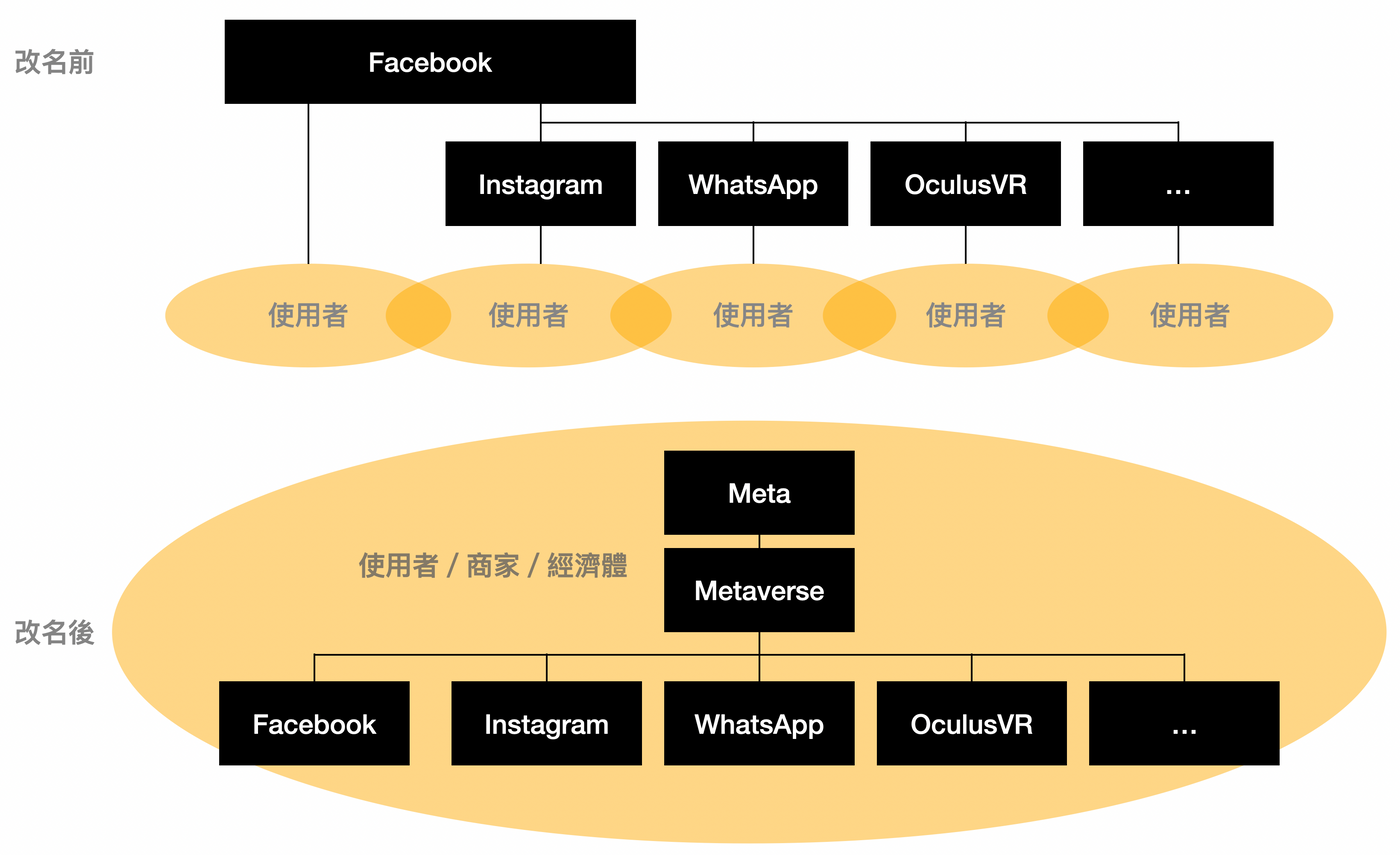
曾任某電動車系統公司行銷長。主業是數位行銷與媒體管理顧問。長年的寫作者、譯者、編輯、重機騎士、雪茄和艾雷島威士忌愛好者。 我也是養兩隻貓的犬派潛水員、健身教練、書法家。 關於我/https://fred.mba
From Facebook to Meta: A Brand Perspective
In the recent article "Why Facebook Boss Changed the Company's Name to "Meta"" ( original ) on The Verge website, the author interviewed Mark Zuckerberg himself and asked what was the motivation and purpose of the name change.
Since it is Zuckerberg's own reply, it should be regarded as no problem with the official opinion. But Zuckerberg explained Facebook/Meta's current direction and motivation in some paragraphs of the interview, and mostly just "answered the truth" from the perspective of "PR news", and roughly explained their current approach.
Nonetheless, this article will briefly discuss this Facebook change and the problems it has to face from the perspective of product development and branding.
Brand Architecture Mobile
Meta or Facebook is a brand. Since Facebook is currently a successful brand, why should it be "degraded" and become a sub-brand under Meta?
There are two types of brands, one is "corporate brand" and the other is "product/service brand". The former definition is usually an ideal, a vision, and a general description range, so it does not necessarily have to be very specific to the product; what?”), to retain flexibility for future development and definition.
The latter will be directly linked to the product or service, as well as the target customer's impression and recognition of these products, so it is usually more specific in the sense or literal.
"Facebook" is an easy-to-remember, image-specific name for a service; but when the company expands to a higher level of ideals and vision than "social networking site," the name doesn't necessarily fill that role . Not to mention, there are products like Instagram and WhatsApp, which can get a little weird if you put the Facebook name on the front.
Therefore, from the perspective of brand management, the move from "Facebook" to "Meta" is a matter of course, and it is quite easy to understand:

"Technology company that connects people"
So in the interview, Zuckerberg had this to say about this:
...we wanted a new brand identity, ...so that, in direction, would align with the vision of the future that we are trying to achieve. First, the higher-level goal is "brand recognition", and the second is a goal of a "technical and functional" nature.
In terms of high-level goals, although Facebook is already an iconic social media brand, we have done more than that; although people think of us as a "social media company," we think of ourselves as a company through innovation Technology, a "tech company" that helps people connect with each other.
We think that's what sets Facebook apart from other companies; because everyone else is trying to figure out how to get people to interact with technology, and the technology we're building is about getting people to interact with each other.
This is the "level movement" mentioned earlier; in short, the name "Facebook" is not high enough relative to its current expansion and future goals.
Interestingly, however, when visitors compared the previous Google renaming of the parent company to "Alphabet", Zuckerberg was a little "truthful":
This question is fine. But that's not what we're going to do (referring to Google's rebranding as Alphabet), our purpose is to be more focused and focused on our purpose (referring to "becoming a company that connects people with technology").
With the new brand architecture, people's relationship with our company, and their relationship with our app, is separate from each other.
The reason why I ask the truth is that the above words are not difficult to understand literally, but they are not clearly explained: why is it also because of the name change and the same "target level", but "it's not that we want to." Things to do"?
This is not clearly stated, nor is it explained in the context; however, it is relatively unimportant.
people's relationship with them
And what is the important reason and rationale for separating "people's relationship with our company" from "people's relationship with our app"?
To put it simply, there is certainly a difference between "people's relationship with Meta" and "people's relationship with Facebook/Instagram/WhatsApp". Just like the definition of "corporate/product brand" mentioned above, the former is that customers trust the company with time, money, etc. and resource investment on the premise of agreeing with the company's vision, hoping that the company can bring the results they want.
That said, it's a level of trust and partnership.
As for the latter, it is a transaction-based, relatively simple user or customer relationship. If you think Meta's Instagram is easy to use, but (for example) the less powerful WhatsApp, maybe you can use Line instead; but if you trust Meta's vision and the product portfolio designed with that philosophy , even if one of its products is weaker or more expensive, it will not necessarily switch to other competing products.
This is similar to the attitude of today's consumers towards companies like Apple, Microsoft, or Samsung: you trust the brand and think its ecosystem is better, and you will tend to continue to use their products; the apparent price or function, all Not necessarily a factor in your buying decision.
Compared with the above-mentioned companies, Meta has just started to establish its own ecosystem. Of course, it will consider the way of "brand structure movement" to rebuild the future environment composed of series products. Here is the so-called "metaverse". ":

(To be clear: the above is my interpretation of Meta's so-called "separation of the company and product relationship", not necessarily Zuckerberg's idea. To be honest, I'm not sure what he meant by this statement; perhaps later Meta What we have done, can give us a clearer enlightenment.)
But as you might notice, in the "after name change" part of the image above, I didn't separate the user from the company/product as Zuckerberg said.
Because as shown in the figure, the user groups of several products were originally separate, but they overlapped with each other to some extent; but after the name was changed to Meta, and the user group was integrated with the single vision of metaverse, and it was successful, in fact, this was the case. The distinction is a false issue, and there will be no clear distinction.
So, this is also where I think more observations are needed.
For example, Toyota tells consumers that "your relationship with Toyota is not the same as your relationship with the Camry", which is reasonable, but consumers may think this is a fake issue. And does a company like Apple, which has established a mature ecosystem, still advocate that "people's relationship with Apple and their relationship with the app store is different"? It's hard to imagine.
Epilogue
From a purely corporate brand perspective, Facebook's "name change" (in fact, it should be said to be a brand adjustment) is quite intuitive. In fact, you can understand it by looking at the two attached pictures.
The bigger significance behind the brand is that Mark Zuckerberg finally officially announced the plan that has been brewing for many years, and implemented it in the brand name and structure adjustment. In our 2017 article "Facebook's AR: A "1.5th Worldview" that is indistinguishable from the real and the fake, we have already discussed:
Obviously, even if this "tight community" is based on AR based on the actual environment (as opposed to fully virtual VR), it is still within the technology and environment defined by Facebook; the so-called "extending online" is also Still within the constraints given by Facebook.
It is also worth noting that the statement "extending the real world to the online" is also carefully designed; we can try to interpret it in two ways:
• Let's change the phrase a bit: "Extend the _____ of the real world online." In this space, there are many things that can be filled in; it can be "relationship", or "business", "emotion", "activity", "transaction", "media", "game"..., as long as It's profitable to fill in.
• “Extending the real-world _____ to the online _____.” In the second space, of course, it will not be anywhere other than Facebook.
Add these two points together, and Zuckerberg's purpose becomes clear.
In addition, it is worth studying what kind of good information Facebook/Meta will come up with after so long in this situation, so that users or businesses are willing to invest in this "co-prosperity circle".
However, Zuckerberg also said this in the interview:
I think the (metaverse) shouldn't really take off until the second half of the 2020s because there's a lot of groundwork that needs to be done first.
The boss has said so, so don't be too hasty; it's better to observe it first, or do some homework first.
Because I also wrote a few days ago:
But compared to these (about the metaverse) "naturally occurring" technological advances, I am more concerned about things that cannot (yet) be virtualized, such as the social/economic/political system after this, urban construction (for example, I started from public facilities such as the aforementioned roads), interpersonal relationships, business structures (such as the link between agriculture and animal husbandry that cannot be virtualized and virtualized currency), financial fairness tilt (groups with/without the ability to engage in virtual economy), and regulation, etc.
And I believe that these are also the homework that Zuckerberg must do before putting the entire Meta Group "all-in" in this field.
There are still many angles to look at on this topic, let's talk about it later as some details are gradually revealed.
reference reading
Like my work?
Don't forget to support or like, so I know you are with me..
Comment…